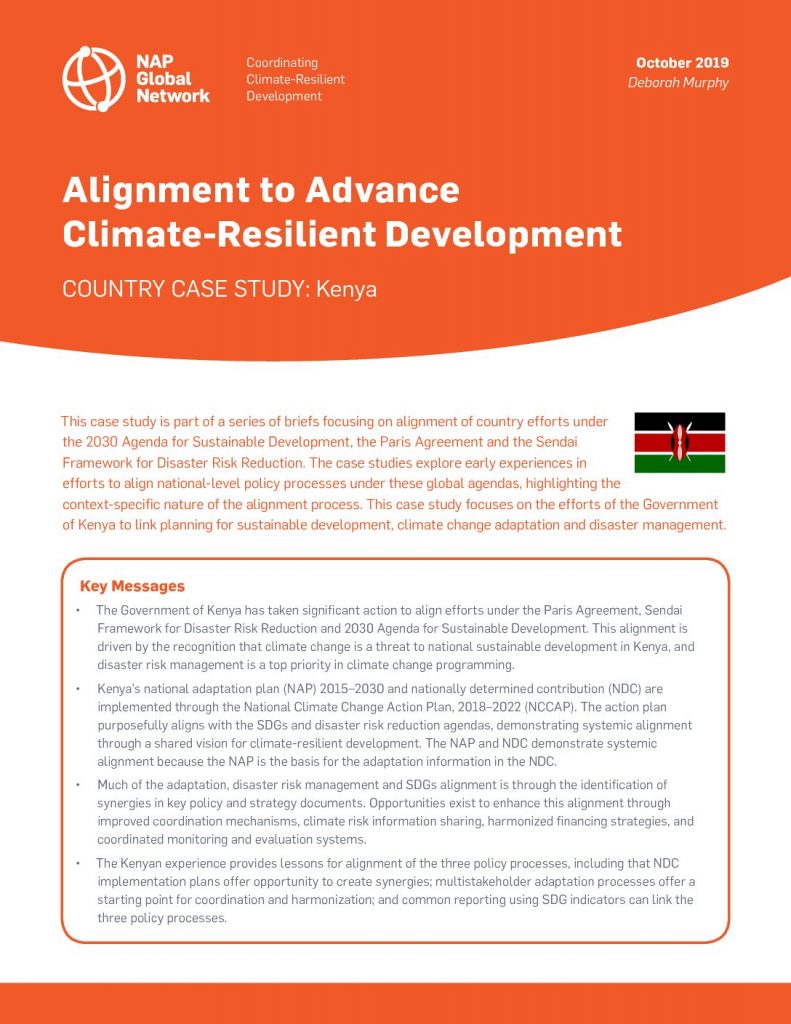
Alignment to Advance Climate-Resilient Development
COUNTRY CASE STUDY: Kenya
This case study is part of a series of briefs focusing on alignment of country efforts under the 2030 Agenda for Sustainable Development, the Paris Agreement and the Sendai Framework for Disaster Risk Reduction. The case studies explore early experiences in efforts to align national-level policy processes under these global agendas, highlighting the context-specific nature of the alignment process. This case study focuses on the efforts of the Government of Kenya to link planning for sustainable development, climate change adaptation and disaster management.
Key Messages
- The Government of Kenya has taken significant action to align efforts under the Paris Agreement, Sendai Framework for Disaster Risk Reduction and 2030 Agenda for Sustainable Development. This alignment is driven by the recognition that climate change is a threat to national sustainable development in Kenya, and disaster risk management is a top priority in climate change programming.
- Kenya’s national adaptation plan (NAP) 2015–2030 and nationally determined contribution (NDC) are implemented through the National Climate Change Action Plan, 2018–2022 (NCCAP). The action plan purposefully aligns with the SDGs and disaster risk reduction agendas, demonstrating systemic alignment through a shared vision for climate-resilient development. The NAP and NDC demonstrate systemic alignment because the NAP is the basis for the adaptation information in the NDC.
- Much of the adaptation, disaster risk management and SDGs alignment is through the identification of synergies in key policy and strategy documents. Opportunities exist to enhance this alignment through improved coordination mechanisms, climate risk information sharing, harmonized financing strategies, and coordinated monitoring and evaluation systems.
- The Kenyan experience provides lessons for alignment of the three policy processes, including that NDC implementation plans offer opportunity to create synergies; multistakeholder adaptation processes offer a starting point for coordination and harmonization; and common reporting using SDG indicators can link the three policy processes.
Read more
- Alignment to Advance Climate-Resilient Development | Country Case Study: Sri Lanka
- Alignment to Advance Climate-Resilient Development | Country Case Study: Colombia
- Webinar | Strengthening Alignment Between ‘Adaptation to Climate Change – Disaster Risk Management – Sustainable Development’
- Overview Brief 1 | Introduction to Alignment
- Overview Brief 2 | Getting Started on Alignment
- Overview Brief 3 | Country Perspectives on Alignment of the National Adaptation Plan (NAP) process and Nationally Determined Contributions (NDCs)
- Report | Adaptation Actions in NDC Partnership Plans: Opportunities for Alignment with NAP Processes
Publisher: International Institute for Sustainable Development (IISD)